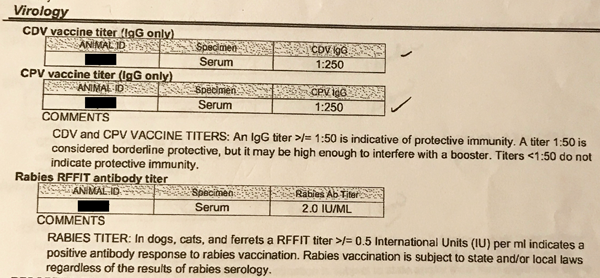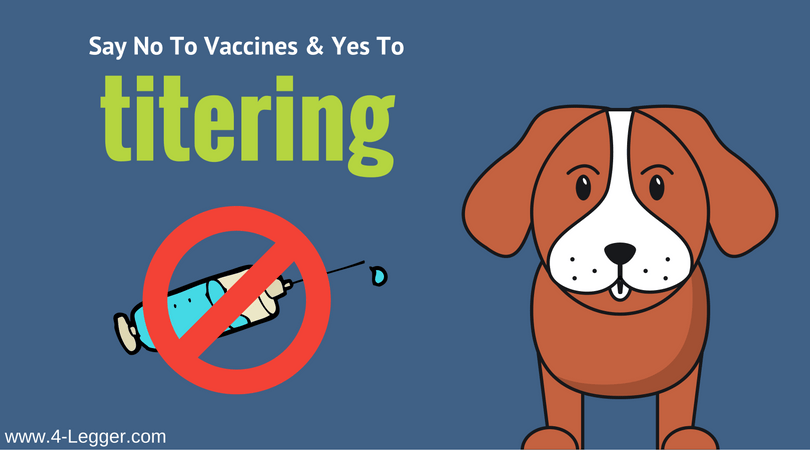Say No to Annual Vaccines and Yes To Titers!
In our last blog post, we talked about our own personal experience with vaccinosis and why, even if your dog hasn't had an immediate reaction, you need to be aware of vaccine dangers.
Learning about vaccinosis led us to titers.
We were already familiar with titers for humans but had never heard of it for dogs, cats, or horses.
What is a Titer?
A titer is a laboratory test that measures the amount of antibodies (also called Immunoglobulins or Ig) in the blood. The amount of Ig indicates how successful that body may be in fighting off a particular disease.
Said another way... does a dog have enough immunity or Ig in their blood to stop the disease from entering or damaging the healthy cells in their body and make the dog sick with a specific disease?
Titers can also serve as a quick health indicator for the body's immune system. If for example the body isn't able to maintain Ig, there is likely something wrong with the immune system.
Anytime you want to test the blood for Ig, you have to test for the specific antibodies against those diseases. For dogs you'd most commonly test for Canine Distemper Virus (CDV), Canine Parvovirus (CPV), and rabies antibody levels.
If the test is positive (above a particular known value) the dog has immunity. If the test is negative (no immunity) or equivocal (not enough immunity) they need to be vaccinated unless they are eligible for a medical waiver.
Here are the tier results from one of our dogs that shows strong immunity to CDV, CPV, and rabies.

As you can see for CDV and CPV, the titer needed to be greater than or equal to 1:50 and our dog scored 1:250! The rabies titer needed to be greater than or equal to 0.5 and our dog scored 2.0! That's some strong fighting power!
Talk to Your Veterinarian about Titering
After one of our dogs had a vaccine reaction and the other, whose immunity testing indicated she was prone to vaccinosis, we loaded up on titering education.
We showed up at our veterinarian's office ready for a stand-off. We were going to submit to the annual check-up but refuse vaccinations and "demand" titering.
Imagine our shock when, as we started to deliver our speech on titering we were told, "Oh, we do titering!" WHAT?! And we've never heard of it?
Clearly titerng was a secret test and was available only to the educated pet parents who knew to ask for it! When we asked why they had never talked to us about titering the answer was simple - most people refuse to pay the higher cost for the titering and opt for vaccination as it is less expensive.
We recommended all pet parents should be given ALL of the options and then let them decide. We are not lemming pet parents. We want all of the information so we could make our own informed decisions.
The High Cost of Over Vaccination
In our post on vaccinosis, we reviewed all of the possible side effects from vaccination.
We've re-listed some of these side effects here:
- Autoimmune Diseases
- Behavioral Changes such as aggression and separation anxiety
- Various types of abscesses and growths by vaccination site
- Allergic hypersensitivity
- Injection-site sarcomas (cancer)
- Thyroid disease
- Heart inflammation
- Chronic digestive problems
- Autoimmune diseases such as those affecting bone marrow and blood cells, joints, eyes, skin, kidney, liver, bowel and central nervous system
Vaccine and Titer Schedule Recommendations
Dr. Ron Schultz, at the University of Wisconsin School of Veterinary Medicine, is the world's leading expert on companion animal vaccinations. Dr. Schultz has been instrumental in getting vaccine recommendations changed from annual injections to 3 years (although he advocated for a 7 year cycle).
Dr. Schultz also recommends dogs should not receive any vaccinations before they are six weeks of age as they get natural immunity through antibodies in their mother’s milk. Not only will the antibodies in the mother's milk protect puppies from disease, but Dr. Schultz has demonstrated that the mother's antibodies will interfere with the vaccinations.
Recommended vaccination schedule for core vaccines:
Dr. Schultz recommends starting core vaccinations at 8-10 weeks, giving a second dose 3 to 4 weeks later and then a final dose an additional 3 to 4 weeks later, making sure the dog is at 14 to 16 weeks of age.
The core vaccines are Canine Distemper Virus (CDV), Canine Parvovirus (CPV-2), Canine Adenovirus-1 (Infectious Canine Hepatitis [ICH])/Canine Adenovirus-2 and Rabies Virus (RV).
After these initial vaccinations, Dr. Schultz recommends doing a titer test at one year and revaccinating (depending on whether or not the dog passed their titer test) or re-titering no more frequently than every 3 years.
Non-core vaccinations such as Canine Infectious Respiratory Disease Complex (CIRDC) also known as kennel cough and Lyme disease should only be given to dogs that are at risk for contracting those diseases.
Bottom Line: Having your dog titer tested a minimum of every 3 years will safely help you determine if your dog has the antibodies to fight off disease before you re-vaccinate. Be sure to ask your veterinarian about titering before vaccination!





